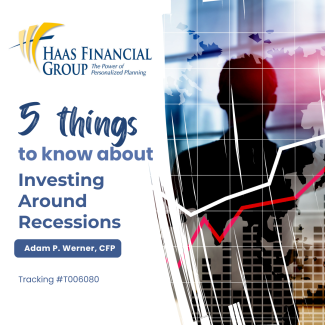
5 Things to Know About Investing Around Recessions
Depending how closely you follow the headlines and financial news, it feels like we’ve been hearing about a pending economic recession in the US for quite a while now. It hasn’t materialized yet, but it’s very natural to fear the word recession based on past experiences. However, not all recessions are created equal. We may not even see a recession this time around, but even if we do, is there something we would need to do differently with our investments? Probably not! The risk of trying to time things correctly may not be worth what we feel would ultimately be a missed opportunity on the other side. We’ll share some thoughts and historical data that we believe is helpful context for navigating the current investment landscape.
1. Market Momentum: A Promising Start to the Year
The adage "history often repeats itself" holds true in the context of market performance. Over the past seven decades, an intriguing pattern has emerged: when the S&P 500 records a gain of more than 7% within the first 100 days of the year, which happened earlier this year, it has gone on to finish the year with positive results each and every time. So, if we end up with a recession or market pullback that leads us into a negative year overall for the S&P 500, it would be the first time since 1950 that the market would have given back those gains by year-end.
2. The Elusive Nature of Recession Timing
Predicting recessions has long been a pursuit of economists and financial experts, yet the track record of successful forecasts remains spotty. Looking back at the last 30 recessions since 1871, it's evident that even with the benefit of foresight, attempting to time the market based on recession signals is far from foolproof. In fact, the S&P 500 posted positive total returns six months prior to the onset of a recession in a majority of cases, emphasizing that market dynamics often defy conventional wisdom.
3. The Illusion of Perfect Timing
Imagine possessing the uncanny ability to predict the start and end of recessions with pinpoint accuracy. Surprisingly, even such an extraordinary skill wouldn't guarantee a flawless investment strategy. Historical data reveals that if an investor were to liquidate their stocks 6 months before each of the past 30 recessions and re-enter the market post-recession, the outcome would be a mixed bag. The market's resilience during certain recessions underscores the intricate dance between economic conditions and stock market performance.
4. Decoupling the Market from the Economy
While recessions undoubtedly impact various sectors of the economy, including publicly traded companies, it's crucial to recognize that the stock market and the economy don't always move in lockstep. Market behavior is influenced by a multitude of factors, ranging from industry-specific considerations (AI, for example) to global outlooks. The forward-looking nature of stock prices often results in the market digesting potential challenges well in advance, as evidenced by the S&P 500's fluctuations over the past year.
5. Identifying Recessions – National Bureau of Economic Research (NBER)
NBER view themselves more as economic historians more than real-time analysts. On average, NBER historically hasn’t made its call on a recession until 6 months after a recession starts. Typically, the clarity that NBER needs to make their determination means their announcement takes place, on average, right around the market lows for that period. This makes sense since once NBER knows the economy is in recession, so do investment markets, which means going into a recession is most likely fully priced in at that point.
As financial planners, we know there is an emotional component to investing. And when headlines get scary and market losses start to pile up, there is an allure to move to something “safe” to reduce anxiety and avoid short-term pain. While that may be a rational approach to alleviate some stress, history tells us that could be a very expensive decision. Yes, economic downturns undoubtedly pose challenges, and the word “recession” is scary. But in our opinion, a holistic approach to financial planning that considers long-term goals and diversification by focusing on “time IN” the market as opposed to “time-ING” the market, remains the most prudent strategy.
Tracking#T006080
Investment Advice offered through Great Valley Advisor Group, a Registered Investment Advisor. Great Valley Advisor Group and Haas Financial Group are separate entities. This is not intended to be used as tax or legal advice. Please consult a tax or legal professional for specific information and advice.
Resources:
https://www.wealthmanagement.com/equities/stocks-beat-cash-even-if-you-could-time-recession
LPL Research Daily Market Update May 26th, 2023

